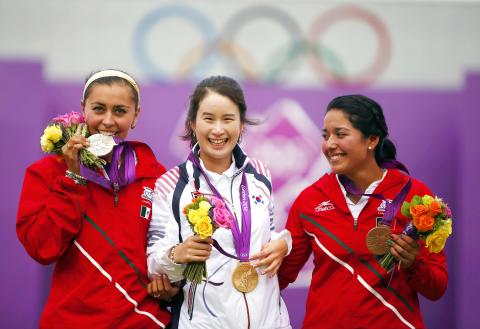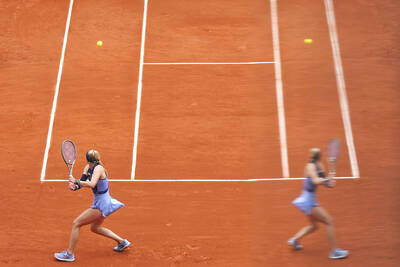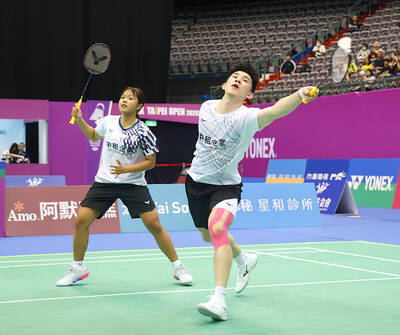South Korean Ki Bo-bae triumphed in a nerve-wracking single arrow shoot-off against Mexican Aida Roman to win the women’s individual archery gold medal at the London Games on Thursday.
Ki, who also won a team gold earlier in the week, continued South Korea’s remarkable dominance of Olympic archery, giving the country a 14th women’s gold medal out of a possible 15 since the 1984 Los Angeles Games.
It is unlikely any of those previous Korean gold medal winners were put under as much pressure as the 24-year-old Ki was on Thursday.

Photo: Reuters
With the scores tied after five sets, Ki and Roman had one extra arrow to decide the fate of the gold.
Top-ranked Ki brought gasps from the crowd when she leaked her shot outside the bulls-eye for an eight, leaving Roman with the task of finding a nine or a 10 to win.
The Mexican loosed her arrow to the target 70m away and could scarcely believe it when she too landed in the red rings for an eight. When officials confirmed Ki’s arrow was closer to the center of the target, the South Koreans erupted in celebration.
“Actually, I didn’t see Aida’s arrow because I was praying so hard,” Ki said, failing to stop her voice from cracking at a media conference.
Ki has struggled for consistency over the past 18 months and said her joy was tempered by her teammates, Lee Sung-jin and Choi Hyeon-ju, failing to win a medal.
“The main feeling is that I never thought I’d be this lucky. Last year at the world championships it was like I was starting archery all over again and I really felt sorry to my seniors,” she said. “Now I can stand proud in front of those Korean archers who came before me.”
Roman was disappointed to miss out on the gold, but proud that she and teammate Mariana Avitia, who won bronze, had given Mexico their first-ever medals in Olympic archery.
Avitia beat American Khatuna Lorig to win the bronze before the dramatic finale.
“The president of Mexico [Felipe Calderon] called me and he was very happy,” Roman said. “Of course he asked me about that eight, but he said all of Mexico was very happy.”
Roman and Avitia were placed in the unfortunate situation of having to face each other in the semi-final, but in the end they were just happy to be returning with medals after their tilt at the team title floundered.
Silver medalist Roman said shooting against her teammate had actually made her more relaxed.
“Uppermost in my mind was that we are a team, whether we compete in the team event or as individuals, that’s why we support each other,” Roman said. “It’s not a case of one of us being better than the other one ... sometimes it turns out better for you, sometimes it turns out worse.”
The 18-year-old Avitia said she finally understood what Olympians felt when they stepped onto the podium to have a medal hung around their necks.
“I used to watch on television medals being given out at the Games — Athens, Beijing — and I often wondered what those people were actually feeling,” she said. “Now I myself am experiencing that same feeling and it’s a great thrill.”

Carlos Alcaraz on Monday powered into the French Open second round with a resounding win to start his title defense, while world No. 1 Jannik Sinner and three-time defending women’s champion Iga Swiatek also progressed at Roland Garros. Four-time Grand Slam champion Alcaraz struck 31 winners in a 6-3, 6-4, 6-2 victory over Italian qualifier Giulio Zeppieri and is to face Hungary’s Fabian Marozsan in round two. Alcaraz is now on an eight-match winning streak at the French Open and also took Olympic silver at Roland Garros last year, losing the final to Novak Djokovic. “The first round is never

TIGHT FINISH: Napoli only needed to do the same as or better than Inter, who won their game against Como 2-0 on the same day, leaving Napoli with a one-point lead The two players who Antonio Conte wanted more than any others secured Napoli their second Serie A title in three years on Friday. Scott McTominay scored with an acrobatic bicycle kick before halftime and Romelu Lukaku doubled the lead with a solo goal after the break in the decisive 2-0 home win over Cagliari. Conte became the first coach to win the Italian championship with three different teams. “Everyone contributed to this — but the coach most of all,” Napoli captain Giovanni Di Lorenzo said. “Napoli needed him to get back on top. He’s phenomenal.” Comparing it to his three Serie A titles won

The journey of Taiwan’s badminton mixed doubles duo Ye Hong-wei and Nicole Chan at the Malaysia Masters in Kuala Lumpur came to an end in the semi-finals yesterday after they suffered a 2-0 loss to China’s Feng Yanzhe and Huang Dongping. Ye, 25, and Chan, 20, teamed up last year and are currently ranked No. 23 in the world. The Taiwanese shuttlers took on China’s second seeds in the mixed doubles event, but proved no match for Feng and Huang, losing the match 10-21, 7-21. In the first half of the first game, the pairings were neck and neck at 6-7 until Ye

SSC Napoli coach Antonio Conte has dragged the team back from disaster and restored them to the top of Italian Serie A, but his future at the Scudetto winners is in doubt even after a triumphant season. The fiery 55-year-old has exceeded preseason expectations and bolstered his reputation as a serial winner by guiding Napoli to their fourth Scudetto, and second in three seasons. However, he might well be on his way in the summer after just one season at the helm as his charged relationship with Napoli owner Aurelio De Laurentiis has simmered throughout the campaign. Conte has said